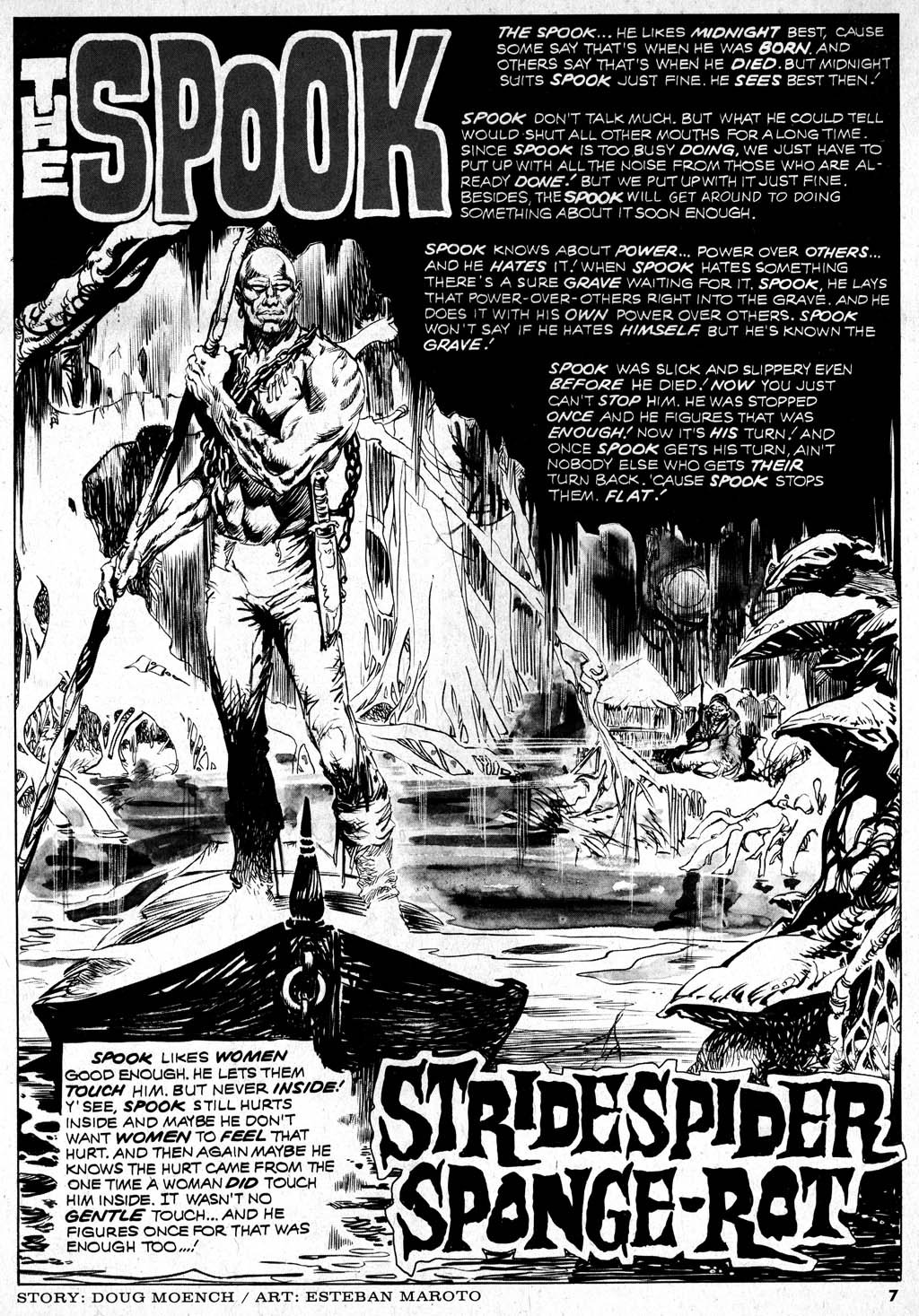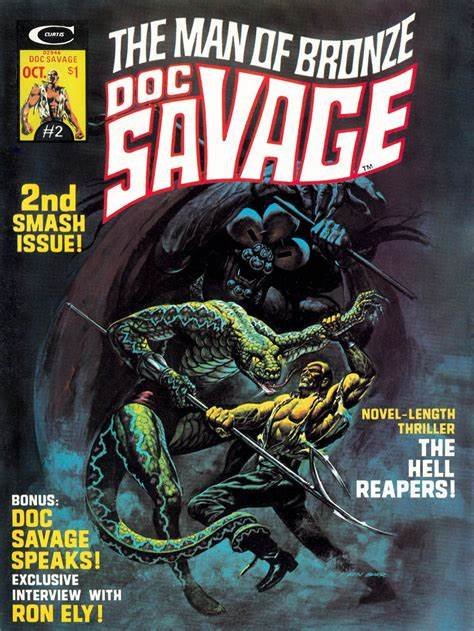Doug Moench: A Half-Century of Bringing the 'Pulp' to Comics
Doug Moench in the early ‘70s.
I just learned that Doug Moench celebrated his seventy-fifth birthday two weeks ago. Such an anniversary cannot go unremarked. If Roy Thomas is taken out of the reckoning, Moench can lay a rock-solid claim to bringing more pulpish goodness to mainstream comics than any other comics scribe, living or dead. Even then, Doug gives Roy a run for his money.
Doug Moench was born in Chicago on February 23, 1948. He grew up on comics, especially horror comics. Thus, when he decided to leap beyond being a comics fan to becoming a pro in 1970, Warren Publishing was where he sent his initial stories. Legendary comics editor/writer, Archie Goodwin, bought all five tales and Moench was off n' running.
Moench very soon began writing for all three of the mainstay Warren mags: Creepy, Eerie and Vampirella. He was also soon paired with some of the best artists in the business, like Esteban Maroto and Richard Corben. Doug would continue to work with some of the finest artists in the comics industry throughout his career.
However, Moench's talent couldn't be contained within the ambit of the Warren mags. His prolificity was noted early on. Something less noted was his ability to adapt to virtually any genre and produce quality work. This was soon evident once Doug jumped over to Marvel in late 1973.
Roy Thomas, recently anointed Marvel editor-in-chief by Stan Lee, had been keeping tabs on the Warren mags. When Roy learned that Marvel was gonna make a big push with their Curtis black-and-white mags, he knew he had to bring Moench over to Marvel. Doug was living well in Chicago with a contract waiting to be signed for a coffee-table book on the history of horror. It took some arm-twisting to get him to move to NYC to do full-time work for Marvel.
Moench started out on the Curtis mags: Savage Tales, Dracula Lives!, Haunt of Horror, Monsters Unleashed, Tales of the Zombie, Unknown Worlds of Science Fiction. That is just a sampling. There were about ten other titles, including The Savage Sword of Conan. Doug contributed to every Curtis title, other than one-shots, during the Seventies. In several cases, every single issue.
Two of the Curtis/Marvel mags that immediately took Moench right out of his horror/Warren comfort zone were Planet of the Apes and Doc Savage. Both runs are remembered fondly by fans half a century later. Having never read a Doc Savage novel in his life, Doug faced a steep learning curve. Despite that, his version of Doc is still considered by many--including yours truly--to be the best rendition of Doc Savage in the comics ever. Click here to read some reviews.
From the get-go, Moench was writing a mind-boggling amount of content for Marvel. For the next eight years or so, he was scripting at least fifty-percent more pages of comics than his nearest competitor in the Marvel Bullpen. More than any writer other than Roy Thomas--who concentrated on the Conan/REH comics and managing all of Marvel's other titles--Doug Moench can be called 'The Marvel Writer of the Bronze Age'. Also--like Roy--Moench was a fan of Edgar Rice Burroughs and Robert E. Howard, bringing a pulp sensibility to his scripts that simply wasn't present in the tales concocted by the rest of Marvel's new stable of scribes. He was ubiquitous and consistently good--and often great.
Doug credits much of his reliably prolific output to his gf-at-the-time and future wife, Debra. She moved with him from Chi-town to the Big Apple. Debra kept Chez Moench rolling along. All Doug had to do was write. And write. And write.
"I'd just roll out of bed, land next to the typewriter and go!" --Doug in a 2015 interview
In 1974, Destiny knocked on Moench's door. America was in the throes of a martial arts craze. A year earlier, Steve Englehart and Jim Starlin had created their own riff on Carradine's 'Caine' character in the Kung Fu TV series. That character was Shang-Chi, Master of Kung Fu. The series was an immediate success, but Englehart and Starlin rage-quit after a few issues because Roy Thomas had--wisely, in my opinion--chosen to have Shang's father be Sax Rohmer's Fu Manchu.
Gulacy art for the cover of Master of Kung Fu #51.
Marvel had a hit on their hands with nobody to write it. Enter Doug Moench--courtesy of Roy Thomas handing him the job. Moench immediately saw that the Englehart/Starlin concept of the character as an aimless, pacifistic wanderer--a template borrowed from the Kung Fu series--was a dead end. Doug leaned into the Rohmer backstory that pissed off Englehart/Starlin, added some updated James Bond-style elements and the classic Master of Kung Fu comic was born.
Moench would go on to write over one hundred issues of MoKF. The first main artist for the series was the Sterankoesque Paul Gulacy. Most fans--and Moench--consider the Gulacy run to be the best, somewhat like the Thomas/Smith run on Conan the Barbarian. However, Mike Zeck and Gene Day would also contribute their own stellar runs to the series.
Meanwhile, back in the mid-'70s, Doug wasn't just writing iconic comics for Master of Kung Fu. He was also scripting a cool run of The Inhumans, adapting classic novels for Marvel Classics Comics, helming Ka-Zar and writing various other comics for Marvel. As one does if one is Doug Moench. A common element running through much of Doug's output at Marvel--and later at DC--was that he tended to write non-superhero comics. He has stated more than once that, if he has to write costumed heroes, he prefers that they be on a basically 'human' level. Thus, his long history of writing protagonists like Shang-Chi, Moon Knight and Batman.
Doug's run on Ka-Zar was great. As with MoKF, he spotted the cul-de-sac, plotting-wise, that was constricting the series. Ka-Zar's Savage Land was relatively vast, but still a 'pocket world'. Moench took Ka-Zar out of the Savage Land and dumped him on an extradimensional planet. Tarzan/Conan on Barsoom, basically. In lesser hands, that could easily suck. With Moench at the helm--along with great art from Val Mayerik--what fans got was some of the best planetary adventure comics to ever be published.
During this same period, Moench was also writing The Rampaging Hulk b&w magazine for Marvel/Curtis. He did great work on that, but then it transitioned to The Hulk!, which I didn't like as well. However, the new back-up feature was Moon Knight, a character Moench had created years before in Werewolf By Night. Moench and Bill Sienkiewicz knocked that one out of the park. It was like the O'Neill/Adams Batman, but Moench was a better writer than Denny O'Neill.
Moon Knight went on to his own flagship series at Marvel and became a hit on the direct market. A mercenary resurrected by the Egyptian god Khonshu, Moon Knight partook of elements found in pulp heroes like The Shadow and The Spider, along with echoes of DC's Doctor Fate and The Spectre. To this day, I prefer (Moench's) Moon Knight over Batman or Daredevil.
Meanwhile—since he had so much time on his hands—Moench was still writing a few stories for Warren. His 1980 three-part tale with Paul Gulacy for Eerie, 'Blood on Black Satin', is a good spine-tingler with some Lovecraft shout-outs.
Along with Moon Knight, Doug's best work during his final days at Marvel would be his two Kull stories done in collaboration with John Bolton. "Demon in a Silvered Glass" might be the best non-REH Kull story ever written. The Moench story in Kull the Conqueror #s 1 and 2 is a close second.
Moench left Marvel Comics in 1982, pushed out by Jim Shooter, just as Roy Thomas had been. Doug landed on his feet, simply moving down the street to DC as Roy had done. He soon found writing gigs on Arion, Lord of Atlantis and Batman. Moench also began writing a cool run of tales for the new Spectre comic beginning in the late '80s.
Moench would return to Batman in the 1990s, co-creating Bane with Chuck Dixon. Doug would also win acclaim--partnering with Kelley Jones--for his Elseworlds series of tales of Batman.
Moench and Gulacy would reunite in 1992 to do a James Bond miniseries for Dark Horse; a natural choice after their work on Master of Kung Fu.
Nowadays, Doug and Debra reside in Pennsylvania. Apparently, royalties from Bane and Moon Knight are coming in handy. That might not be the case if Moench hadn't been voted vice president of Neal Adams' Comics Creators Guild in 1978. According to Doug, that happened almost by accident. He certainly doesn't regret it now.
Well, DMR readers, I think I'll end this here. I have barely scratched the surface of Doug's legendary career. I plan further Moench posts for the future.
Happy belated birthday, Doug! Thanks for a half-century of great, pulp-tinged comics.
Two good interviews with Doug Moench can be found here and here.









